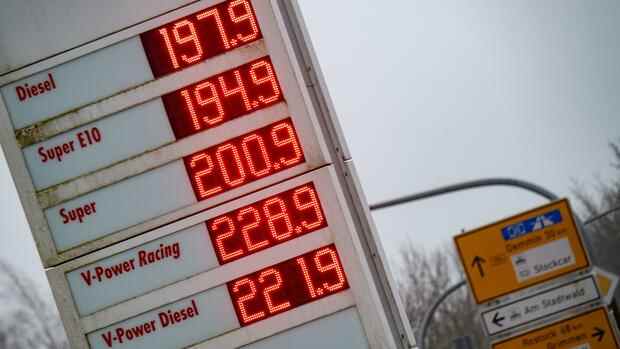Berlin The federal government’s relief package turns out to be a stress test for the traffic light coalition. As the Handelsblatt learned from coalition circles, it is questionable whether the planned financial support will also reach consumers.
The problems are mainly of a legal nature. According to coalition circles, it is not legally possible to safely pass on the tank discount to drivers. The same applies to the planned discount on local transport tickets.
For example, the energy tax on fuels is to be reduced to the European minimum, so that petrol can become 30 cents cheaper and diesel 14 cents cheaper. A monthly ticket for local transport should only cost nine instead of more than 60 euros for three months.
Top jobs of the day
Find the best jobs now and
be notified by email.
In both cases, however, the companies would have to pass on the discount. And therein lies the problem: According to coalition circles, the mineral oil companies could not be obliged to pass on the temporary tax cuts on petrol and diesel.
So far, however, this has been considered an essential condition in the coalition in order to carry out the measure at all. “We ensure that the reduction is passed on to consumers,” says the final document on the relief package.
In the draft law on the tank discount, which the Federal Ministry of Finance sent out on Friday, there is nothing more about this. “Effects on individual prices and the price level, especially the consumer price level, are to be expected and the purpose of the law,” says the draft only in general terms. The text, on the other hand, is specific to the costs for companies that arise from the law: They are estimated at more than 115,000 euros. The losses for the federal government should amount to at least 3.15 billion euros.
>> Also read here: Because of fuel prices: Cartel Office takes a close look at refineries
In its draft, the government only formulates the expectation that prices and taxes will fall. Since companies have so far passed the energy tax on to customers in full, this should also happen in the opposite direction.
This “enables” consumers, but also bus and logistics companies, to be relieved, as the draft says – albeit with the restrictive note: “The pricing at the gas station depends, among other things, on the previous supply chain of the fuel purchased and is responsible the relevant operator.” This means that it is ultimately the gas station attendant who decides on the price per liter, not the federal government.
The federal and state governments are negotiating local transport regulations
The matter with the planned ticket discount in local transport seems to be just as problematic. Here, too, it is difficult to oblige the transport company to use the money for the ticket discount. A federal-state working group met this Tuesday. The main issue was how the discount can be legally stipulated.
Since the federal states set the tariffs, the passenger transport law should actually be changed. However, this was rejected out of concern that alternative local transport providers such as Uber and others could then insist on further liberalization of their services.
>> Also read here: Relief package: The nine-euro ticket causes confusion – for customers and transport companies
As an alternative, it was therefore considered to adapt the regionalization law. In it, the federal government has determined how many billions of euros the federal states receive each year to order local transport from companies. Obviously, however, the law does not succeed in anchoring the 2.5 billion euros estimated for the ticket discount for a specific purpose, as coalition circles said.
Both the tank discount and the ticket discount were penned by the liberals. In view of the petrol prices of around 2.20 euros per liter, Federal Finance Minister Christian Lindner (FDP) had publicly proposed a tank discount in mid-March and without consulting the coalition partners. As a result, the Greens in the coalition committee had insisted on a discount in local transport.
Prices are currently falling again
During the night of the negotiations, Federal Transport Minister Volker Wissing (FDP) finally proposed a compromise as a compromise: the 9/90 ticket was born. At the same time, the price reduction was intended to attract motorists to the bus and train.
However, the proposal was neither discussed in advance with the federal states responsible for local transport nor with the companies that have to implement the idea. Since then, there has been helplessness in the local transport industry, which the federal-state group is supposed to dissolve.
As it was said, the federal government will have to rely on declarations of intent from the oil companies as well as the local transport companies.
The regulations are to apply from June. At the moment, however, the prices at the petrol station are falling again and are below the two euro mark for petrol, for example. It is also unclear whether consumers have driven less cars since the end of February in view of the higher prices. According to the mineral oil industry association, the official figures for March will not be available until May.
More: Speed limit, highways, e-cars: why the Greens and FDP really argue

